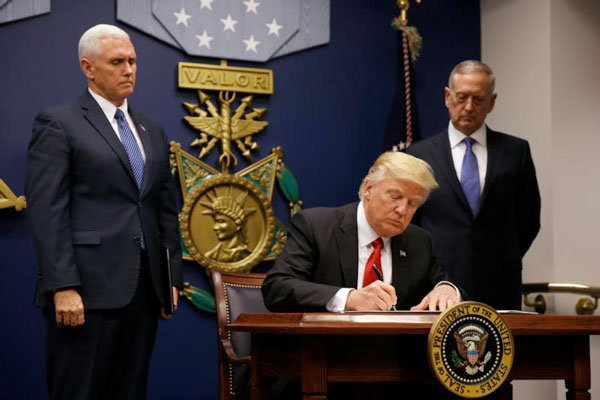
By Mark Pattison
WASHINGTON (CNS) – Within hours of President Donald Trump’s new executive order March 6 banning refugees from six majority-Muslim nations, Catholic and other religious groups joined secular leaders in questioning the wisdom of such a move, with others vowing to oppose it outright.
Bill O’Keefe, vice president for advocacy and government relations at Catholic Relief Services, said in a statement, “As the world’s most blessed nation, we should be doing more to provide assistance overseas and resettle the most vulnerable, not less. It is wrong, during this time of great need, to cut humanitarian assistance and reduce resettlement.”
O’Keefe added, “Refugees are fleeing the same terrorism that we seek to protect ourselves from. By welcoming them, we show the world that we are an open, tolerant nation which seeks to protect the vulnerable. That has always been America’s greatest strength.”
“At the heart of the work of Catholic Charities is the Gospel mandate to welcome the stranger and care for the most vulnerable among us,” said Dominican Sister Donna Markham, president and CEO of Catholic Charities USA.
“Today’s executive order not only hinders that work, but also effectively abandons, for four months, the thousands of endangered refugees fleeing violence, starvation and persecution,” she added. “It is deeply disturbing to know that the thousands of women, children and other persecuted individuals around the world will face a closed door rather than a helping hand from the United States.”
The revised order replaces Trump’s Jan. 27 order, which has been blocked in the courts. The new order imposes a 90-day ban on issuing visas to people from six predominantly Muslim nations; Iraq is no longer on the list. The countries are Iran, Libya, Somalia, Syria, Sudan and Yemen.
It suspends the U.S. refugee program for all countries for 120 days. It also excludes lawful permanent residents – green card holders – from any travel ban. The new order will not take effect until March 16.
Bishop Joe S. Vasquez of Austin, Texas, chairman of the U.S. bishops’ Committee on Migration, said Trump’s new order still puts vulnerable populations at risk.
‘Innocent Lives at Risk’
“We remain deeply troubled by the human consequences” of the order, he said in a statement. “While we note the administration’s efforts to modify the executive order in light of various legal concerns, the revised order still leaves many innocent lives at risk.”
He said the Catholic bishops welcomed Iraq being removed from the list of countries, but remain disappointed the order still temporarily shuts down the refugee admissions program, reduces by more than 60 percent the number of refugees who can enter the country and still bars nationals from six countries.
The bishops “have long recognized the importance of ensuring public safety and would welcome reasonable and necessary steps to accomplish that goal,” Bishop Vasquez said. “However, based on the knowledge that refugees are already subjected to the most vigorous vetting process of anyone who enters the United States, there is no merit to pausing the refugee resettlement program while considering further improvement to that vetting process.”
“A ban regarding human beings, because they are from a certain country or practice a particular religion is clearly xenophobic, nationalistic and racist,” said a statement by Sister Patricia Chappell, a Sister of Notre Dame de Namur, who is executive director of Pax Christi USA.
“Now is the time to honor the commitment for justice expressed in all faith communities and to proclaim this commitment with actions that uphold the rights of all people,” she added.
Scott Wright, director of the Columban Center for Advocacy and Outreach, said that Columbans “have always welcomed migrants and refugees, we do so every day at the U.S.-Mexico border.”
“We must always remember that we are a nation of immigrants and refugees and we are called to stand in solidarity with them,” he said.
People of faith “are called to both address the root causes of migration and seek policies of welcome toward our migrant sisters and brothers,” Wright continued. “We stand against any policies that seek to build a wall, inhumanely detain and deport women and families, or limit migration based solely on a person’s country of origin or religion.”
Eli McCarthy, director of justice and peace for the Congregation of Major Superiors of Men, called it “completely unjust to punish an entire country due to the suspicion of a potential crime by an individual.”
